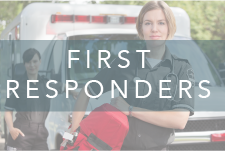How to Prepare for the Future
It's no secret that the life of a first responder is not an easy one. They often see things that the average person could never imagine and this can take its toll both mentally and physically. As a result, many first responders struggle with retirement. They may feel like they are not ready to leave their career behind or they may not know how to transition into civilian life. In this blog post, we will explore some of the challenges that come with retirement for first responders and offer tips on how to prepare for the future.
First Responders are exposed to traumatic events on a daily basis. This can lead to PTSD, depression and other mental health issues. As a result many first responders may struggle with retirement because they feel like their work is done or that there will be nothing left for them when it's all said and done.
Retirement can also mean the loss of identity for some first responders who have been doing this job for so long that they no longer know how to be anything else but an emergency worker.
Retiring from this profession means leaving behind everything you've ever known and starting anew as someone else entirely different than before - which isn't always easy! And while some people might think that working towards your goals should make life easier after retiring from a job like this, it can actually be just the opposite. Being proactive and understanding the difference between workplace identity and personal identity is key earlier in your career.
Transitioning into civilian life after being a first responder can be difficult because there are not many jobs out there that offer the same level of challenge as emergency work does. This can leave first responders feeling lost and unfulfilled after retirement. They may also have trouble adjusting to a more normal routine and having less structure in their day-to-day lives.
Tips on How to Prepare for Retirement?
Talk to Family
Talk to your family about what you're going through. Don't try to deal with everything on your own! Sharing your thoughts and feelings with those closest to you can help make the transition a bit easier.
Get Professional Help
Seek out a first responder rehab or treatment. There are many programs out there that can help you deal with the mental health issues that often come with this job.
Be Active
Stay active and continue doing the things you love. Staying busy will help keep your mind off of retirement and make the adjustment process a bit smoother.
Reach Out
Connect with other retired first responders. There are support groups out there for people who have gone through what you're going through. Talking to others who understand what you're going through can be really helpful in terms of feeling understood and not so alone.
Plan Ahead
Retirement may seem like a long way away, but it's never too early to start planning for it. Make a budget, figure out what you want to do with your free time and set some goals for yourself. Having a plan will help make the transition smoother when the time comes.
Common Problems First Responders Face in Retirement
The retirement of first responders can be a difficult time. They may face many common problems, such as boredom and isolation. This is often due to the stigma attached to mental health issues in these professions. First responders may also find it difficult to adjust to their new lifestyle after years of working long hours. It is important to prepare for these challenges ahead of time and seek help if needed. Doing so can make the transition much smoother.

As a First Responder, you've spent your entire career helping others. Whether it's been as an EMT or paramedic, police officer, firefighter or other role in public safety -- the job leaves little time for hobbies and personal interests. It may not have occurred too many that this could cause problems later on when it comes time to retire.
But for many first responders, the sudden change from a busy work life to one with plenty of free time can be difficult. This can lead to feelings of boredom and isolation. Some first responders may also struggle with adjusting to their new "normal." Especially after years of working long hours and rarely taking vacations.
It's important to anticipate these challenges ahead of time so they don't catch you off guard. Find hobbies and interests now, while still working full-time, as a way to prepare for your retirement years later on down the road. This can help reduce the risk of boredom and isolation setting in.
If you're struggling with retirement, don't be afraid to ask for help. There are many resources available, including support groups specifically for first responders. Don't let the stigma attached to mental health issues keep you from getting the help you need. With the right support, it's possible to find peace and contentment in your retirement years.
Some Health Problems May Get Worse
First responders often suffer from health problems that may get worse when they retire. Conditions such as physical injuries, post-traumatic stress (PTS), and depression can be exacerbated by retirement. For example, a first responder who has dealt with chronic pain throughout his or her career may find the pain more challenging to manage after retiring. Similarly, a first responder who has already dealt with PTSD or depression may find the symptoms of these mental health conditions get worse when he or she retires.
If you’re retiring from your role as a first responder and are worried about how it will affect your physical and/or mental health, speak with your doctor about your concerns. He or she can work with you to find the right treatment plan for any health conditions you may have and help ensure that you remain as healthy as possible during retirement.
When to seek Help from a Medical Professional
Alcohol and Substance Abuse
Alcoholism is a disease that can destroy your career, relationships, health and life. Alcoholics are very secretive in their drinking habits because they fear being labeled an alcoholic or having someone see them out of control. Alcoholics will have a strong desire to continue drinking despite knowing the consequences they will face if they don't stop. Alcohol will also cause you to make poor decisions, and can lead to fights, accidents or job loss.
Substance abuse is the use of drugs for non-medical reasons. Drug addiction is a disease that causes changes in the brain that result in an inability to control drug use. Substances such as cocaine, heroin, marijuana and hallucinogens can cause some of the same problems as alcohol. Alcoholism or substance abuse may cause poor appetite or for you to sleep poorly. Alcoholism and substance abuse are very similar to one another in that both result from lengthy use which causes changes in the brain's pleasure centers. Alcoholics/substance abuse may also have medical or mental health problems as a result of their use
Isolation
Spending too much time by yourself can contribute to stress and anxiety if you spend all your free time alone without interacting with others, especially family and friends. Isolation can also lead to depression and loneliness, which are both risk factors for suicide. If you're feeling isolated, it's important to reach out to others and talk about your feelings.
Lack of Sleep or Nightmares
Not getting enough sleep is a common problem for first responders, who often have irregular work hours. Lack of sleep can affect your mood, making you feel depressed or irritable. If you are not sleeping well as a result of nightmares, then it is important to seek help from a doctor.
Agitation and Increased Stress
It's normal to experience agitation when faced with stressful situations, but if the level of agitation becomes too great and you feel like you're about to explode, it can be difficult to control.
You may also experience increased stress levels in your personal life...
Relationship Problems
First responders often have relationships with their coworkers, family members and friends that are strained by the stressful nature of the job. If you're having relationship problems at work or home, it's important to seek help from a doctor or counselor so that they can help you work through your problems.
Depression and Anxiety
Mental health issues such as depression and anxiety disorders. Depression is a common mental illness that affects many people every year, including first responders. It can cause symptoms such as sadness, loss of interest in activities once enjoyed, anger or irritability, low self esteem and suicidal thoughts or behaviors. If you are experiencing any of these symptoms, it's important to seek help from a mental health professional.
Anxiety disorders are the most common type of mental illness in the United States, affecting about 18% of adults each year. Symptoms of anxiety disorders can include feeling restless or tense, having difficulty sleeping, feeling irritable or short tempered and experiencing panic attacks. If you are experiencing these symptoms, it's important to seek help from a doctor or mental health professional.
If you are experiencing any of the problems listed above, it is important to seek help from a doctor or counselor. First responders often have a difficult time seeking help because they feel like they need to be strong for others. However, it is important to remember that you cannot help others if you are not taking care of yourself. There are many resources available to first responders who need help, so don't be afraid to reach out for assistance.
You are not Alone.
Transition is difficult and common.
There are many First Responders that experience the same emotions and difficulties you are experiencing. First Responder Retirement is a difficult transition for a number of reasons.
First responders often feel inadequate in their ability to express how they feel about retirement. They may be used to expressing themselves by actions rather than words. This transition is difficult and common, don't feel like you are the only one experiencing this.
There are a number of First Responder Retirement support groups available to help you through your retirement. The First Responders Retirement Transition group on Facebook is a great resource for finding these groups. You can also find many articles and resources online that can help you through this difficult time.
One of the best things you can do for yourself is to keep busy and stay active after retirement. This will help you adjust to your new life and give you a sense of purpose. There are many opportunities available to First Responders after retirement, including but not limited to:
Teaching or mentoring
Working with a First Responder Charity
Becoming a First Responder Ambassador
Starting your own Business
There are many options available to you, and the best way to find out what is right for you is to explore! Don't be afraid to reach out to those who have already retired and ask them how they adjusted.
First responders are put on the front line, confronting stress every day. Building emotional resilience is necessary for maintaining a healthy and optimistic outlook.
At Chateau Recovery, we understand the unique position that first responders are put in. Our Master's Level Clinicians are ready to help build your emotional resilience. Our First Responder Resiliency Program places your with peers and professionals.








